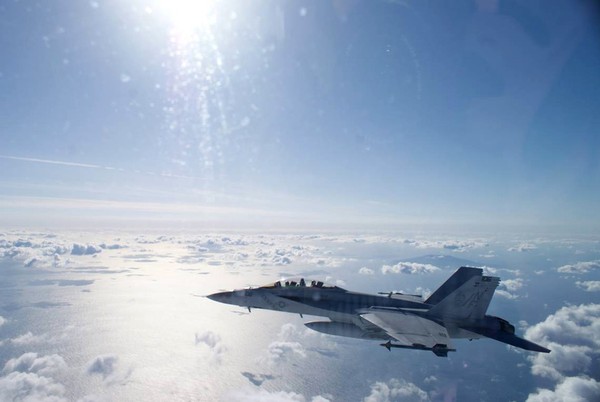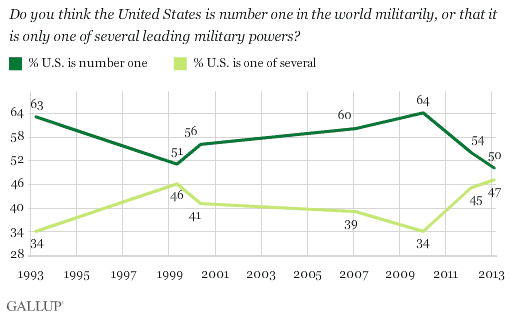Americans don't understand just how strong the U.S. military is.

America has not faced a military equal for decades now. The U.S. routinely outspends all of its potential rivals combined and while it doesn't boast the largest nuclear arsenal in the world in numeric terms, it's generally considered qualitatively superior to Russia's nuclear stockpile.
Yet a surprisingly large number of Americans don't seem to grasp their country's military superiority.
According to Gallup, fully 47 percent of Americans think that the U.S. is merely one of several leading military powers. The 50 percent who answered correctly that the U.S. is the leading military power represents an all-time low for the figure:

Daniel Larison takes a stab at explaining why so many people don't understand America's relative military standing:
When the U.S. fights major foreign wars, the well-publicized exercise of U.S. military powerâ??no matter how unnecessary or self-defeatingâ??drives the public perception that the â??U.S. is number oneâ? up and drives the other result down. When the U.S. concludes these wars or is perceived to be in the process of bringing them to a conclusion, we seem to see the reverse. A related explanation is that concluding wars, withdrawing forces from other countries, and considering the possibility of reduced military spending provoke hawkish warnings of American â??decline.â? That leads to a different sort of alarmism about the dangers to the world that could result from this so-called â??decline.â?
Robert Golan-Vilella adds more:
One reason is the habitual tendency of U.S. policy makers to exaggerate threats and dangers around the world, as Micah Zenko and Michael Cohen chronicled in their Foreign Affairs essay â??Clear and Present Safetyâ? last year. With leaders constantly stressing how dangerous and threatening the world is, itâ??s no wonder that the U.S. public believes a number of mistaken things about global affairsâ??and that many of them involve either overstating threats or understating Washingtonâ??s own power. For example, a 2010 CNN poll found that 71 percent of Americans believe that Iran currently has nuclear weapons. A separate CNN poll in 2012 indicated that Americans believe that the threat from Iran is on par with the danger presented by the Soviet Union in the mid-1980s. These latest results from Gallup appear to be part of the same story.
(AP Photo)



